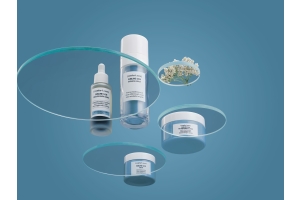Table of Contents
Daily sun protection is an integral step in an anti-aging skincare routine. But not all sunscreens are created equal. Some will be more effective, and some may create unwanted skin problems. People with dry or oily skin who already face daily challenges with skincare may not be too keen to add another layer of product to their skin.
However, no matter the skin type, everybody should use sunscreen daily. Finding a sunscreen that will protect your skin without creating additional problems is the key. Thankfully, some sunscreens strategically combine active ingredients to benefit your skin while protecting it from the sun. There is, indeed, a sunscreen for different skin types.
What Is the Best Sunscreen for Dry Skin?
If you have dry skin, choose a sunscreen that is hydrating and offers effective protection against the elements. Always choose a broad-spectrum sunscreen, as it protects against both UVB and UVA rays. Many sunscreen formulas are naturally richer, making it easier to find a sunscreen for dry skin. Look for ingredients such as shea butter, hyaluronic acid or antioxidants, which will help boost your skin hydration.
The best sunscreen for dry skin should not contain alcohol products, as these would dry the skin even more. If your skin is very dry, use a quality post-sun exposure product to rehydrate it.
What Is the Best Sunscreen for Sensitive Skin?
For sensitive skin, choose sunscreens that don’t contain any perfume and that have a lighter texture. Avoid sunscreen with harsh components or textures that won’t be absorbed easily by your skin. Mineral sunscreen is better suited for sensitive skin as its ingredients, such as zinc oxide, are usually gentler. Zinc oxide is an active ingredient that protects from the sun and soothes irritated skin.
To make it simpler, choose a sunscreen with a shorter list of ingredients, as these are likely to be the best sunscreens for sensitive skin. The shorter the list, the fewer chances you’ll find an ingredient that causes inflammation.
You can also look for products containing aloe vera or other naturally calming ingredients. These gentle ingredients are often found in sunscreen for sensitive skin. Depending on how sensitive your skin is, you should use a cooling product on your skin after a day spent outside.
Which Sunscreen Is Best for Oily Skin: Gel or Cream?
Both options can be appealing, but the gel is often the best sunscreen for oily skin. Look for mattifying and non-comedogenic ingredients. Whether you use a gel or a cream, a lightweight formula is better for oily skin. A mineral sunscreen, instead of a chemical, may also be better suited for oily skin.
Another solution for sunscreen for oily skin is powder sunscreen. Although it doesn’t provide the same level of protection as gel or cream, it can be a practical choice, especially for touch-ups during the day when your skin starts to appear shinier.
While many tinted sunscreens don’t usually work well with oily skin, some are specifically created for it. These will mattify the appearance of the skin, unify it, and still give great protection against the sun.
Does Sunscreen Help With Acne?
It is important to know that, contrary to popular belief, not all sunscreens will cause acne. If you are afraid that adding a coat of product to your skin will cause you to break out, know that it shouldn’t be the case, especially if you choose your sunscreen wisely.
Does sunscreen help with acne? It might come as a surprise that some sunscreens can help clear out acne. Choose a brand that uses active ingredients to help control acne while protecting you from the sun. Make sure to select a sunscreen that is non-comedogenic and without oily ingredients like coconut oil, cocoa butter or flax seed oil. Ingredients like clay, silica or zinc are good choices, as they help control breakouts.
A tip for acne-prone skin is to use a good toner, such as witch hazel, before applying sunscreen. This will clear out any excess oil on your skin. One thing is sure: do not skip sunscreen, hoping the sun will dry out your pimples. You’ll only cause more skin problems in the long term and be more at risk for skin cancer.
Make sunscreen a daily habit to keep your skin safe and healthy, regardless of your skin type. Step out into the sun confidently, knowing that you are well-protected, and your skin is at its best.







Enter the email associated to your BeautySense account and we'll send you a link to reset your password.